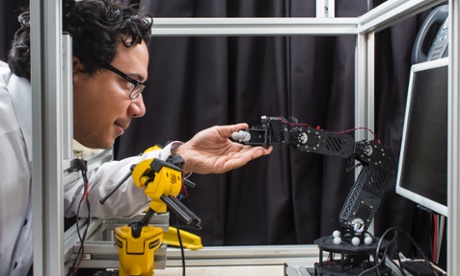DoC Academic and his team's research featured in "The Guardian".

Dr Aldo Faisal and his team's work on creating an eye tracker for 43 pounds featured in "The Guardian"
Dr Aldo Faisal and his team have created a budget eye tracking device for £43 which will open up computer use for millions with restricted mobility and could hit the shelves within two years. Compatable devices normally cost around £20,000.
This device was created after Aldo and his team stumbled on a £9.95 web camera being sold with a games console. They bought and reconfigured two of these cameras and fixed them to a harness which was then placed on the head of the operator. Thus opening up the use of computers to the user and potentially to six million people in the UK with restricted hand movement.
While eye tracking has been done before, the team showed that it could be achieved at a fraction of the cost and could eventually lead to such devices being sold commercially on the high street.
The cameras tell the computer where the user is looking, allowing a cursor to be moved around the screen. A wink by the operator fulfils the role of clicking a mouse or the pressing of a "return" or "enter" button.
Earlier this year, similar technology developed by Aldo and his team was used to produce a wheelchair that could be controlled using the eyes. The software detects where they want to go via a £120 eye-tracking bar.
The software can distinguish between when the user is looking around and when they want to move and the wheelchair responds within 10 milliseconds.
Dr Aldo Faisal states:
“It may not be the best hardware to do the job but we have by now such good software algorithms that can do data analytics and data processing that you put the intelligence into the software and not the hardware”.
“That is really the transformative thing. So a lot of biomedical engineering devices to help people [are] focused on the hardware – better sensors, better pumps – but most of the time it is how you control stuff, how you analyse the stuff that allows you to do things well.”
Dr Aldo Faisal’s lab straddles bioengineering and computing and works to unravel how the brain functions and how subsequently this knowledge can be applied to devices, assisting people with restricted mobility.

Aldo and his team's discoveries could help amputees, people with paralysis, those with arthritis, and the aged to be more mobile. Since the control of the eye comes straight from the brain, injuries to the spinal cord or amputations do not affect eye movements.
To read more see:
Article text (excluding photos or graphics) © Imperial College London.
Photos and graphics subject to third party copyright used with permission or © Imperial College London.
Reporter
Press Office
Communications and Public Affairs
- Email: press.office@imperial.ac.uk
